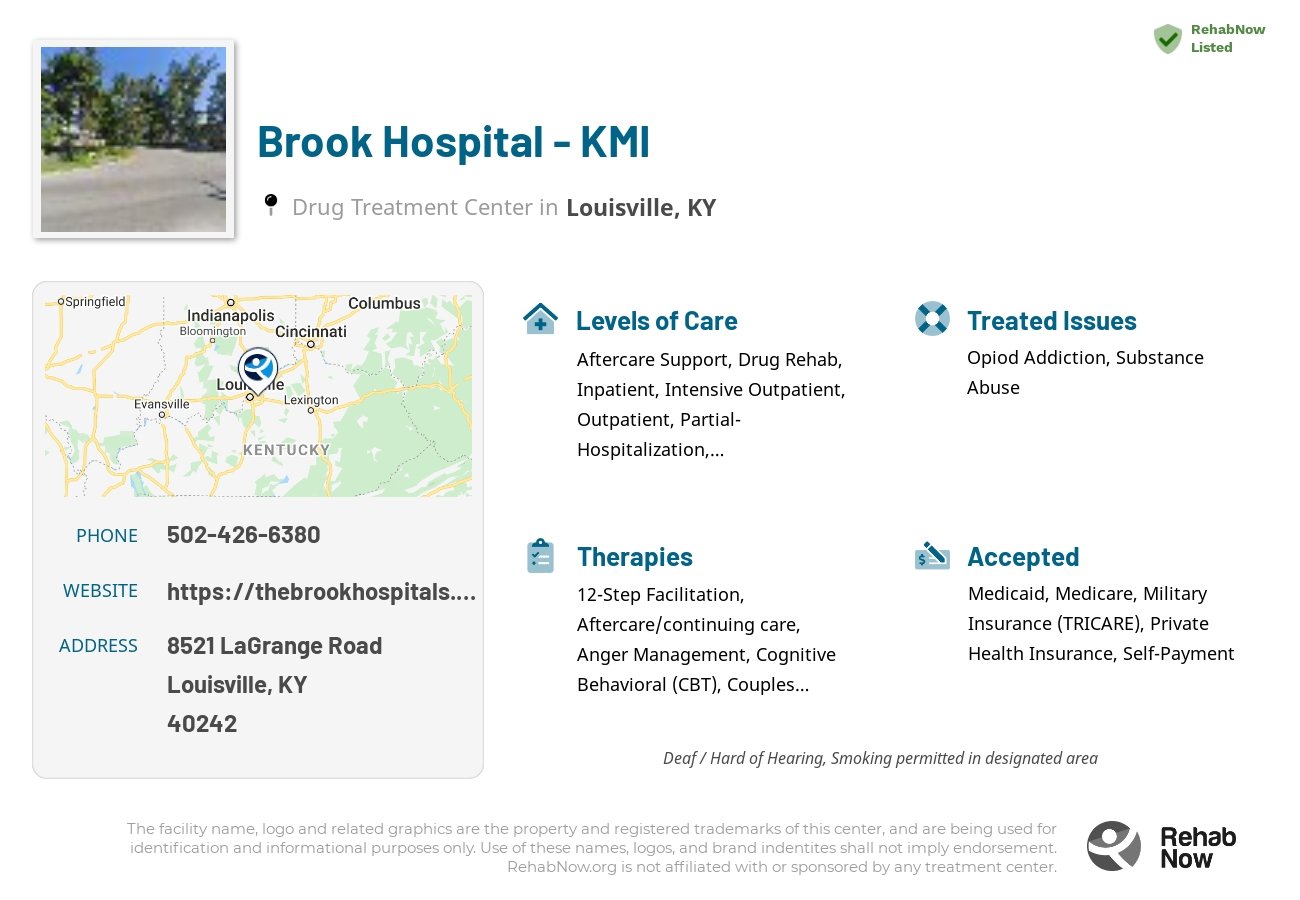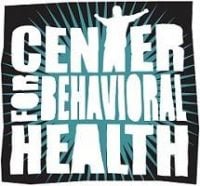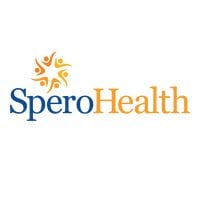Brook Hospital - KMI
Drug Rehab Center in Louisville, Kentucky
Brook Hospital - KMI is a comprehensive addiction treatment facility located in Louisville, KY offering an array of evidence-based services, from detox and residential programs to aftercare support and intensive outpatient care, designed to help individuals achieve long-term sobriety.
About This Louisville, KY Facility
Brook Hospital – KMI is a renowned hospital located in Louisville, Kentucky, specializing in the treatment of addiction and substance abuse. Established in 2016, the hospital offers comprehensive programs to help individuals suffering from addiction and their families. Brook Hospital – KMI is known for its progressive approach to addiction recovery, focusing on a multidisciplinary system that includes medical, psychological, and psychosocial treatment methods.
Brook Hospital – KMI offers a wide range of treatment services, such as detoxification, individual and family counseling, inpatient and outpatient care, medication-assisted treatment, and sober living options. They also provide services to help patients find employment, housing, and handle legal issues, as well as psychoeducational and relapse prevention programs. The hospital also helps patients build self-esteem and prepare them for a healthy and fulfilling life after recovery.
Brook Hospital – KMI is accredited by the Joint Commission on Accreditation of Healthcare Organizations and is licensed by the Kentucky Board of Alcohol and Drug Counselors. They’re also a member of the National Association of Addiction Treatment Providers. The hospital has been recognized by the American Society of Addiction Medicine and the National Council for Behavioral Health for their innovative approach to addiction treatment, and has won the 2018 Excellence in Substance Abuse Treatment Award.
Genders
Ages
Modality
Additional
Conditions and Issues Treated
Substance abuse is the excessive use of any type of drug. This includes alcohol, medications and illegal drugs. Substance abuse is treated with a combination of physical and mental treatments. Brook Hospital - KMI patients detox and follow up with therapies that target the underlying cause of the addiction.
Opioid addiction is one of Kentucky‘s most prominent forms of addiction. Drugs, including heroin, oxycontin, and fentanyl, are the most common. To relieve pain, or ease other ailments, they are professionally prescribed, but they are often abused because they and the feelings they give are addictive.
Addiction is treated by detoxifying the body, so the medications’ chemicals are no longer impacting the individual. Brook Hospital - KMI offers therapies to correct behavior and target the root of the problem are supplemented during and throughout treatment.
Levels of Care Offered
This center offers a variety of custom treatment tailored to individual recovery. Currently available are Aftercare Support, Detox, Drug Rehab, Inpatient, Intensive Outpatient, Outpatient, Partial-Hospitalization, Residential, with additional therapies available as listed below.
Detox treatment begins when the patient leaves their surroundings of family and friends, which is usually when they are most vulnerable. Being in a safe environment surrounded by medical professionals provides them with the safety net many of them need to get over their addiction. With kind and caring staff members, patients can feel relaxed, and they will need to start by admitting that they have a problem in order to get better.
If a person goes through detox treatment, they will understand their addiction better, and they won’t want to relapse and lose all the benefits of sobriety. They can see the effects of using drugs and how it makes them feel, which will make them want to quit their addiction.
Drug detox is vital to the recovery process, and it ensures that a patient will be in a safe environment during their withdrawal.
An inpatient is a person who stays in a hospital or rehab center during treatment. For alcohol- and drug-dependent individuals, inpatient rehabs provide individualized around-the-clock services. Inpatient treatment programs address a person’s unique physical, medical, and psychological needs. A team of experts assess the severity of the addiction and design a highly tailored program. typically, the length of stay in an inpatient facility in Louisville, KY is 30 days. Those with severe addiction may need to stay at the facility for 60 to 90 days.
Intensive outpatient programs mostly conduct meetings on weekdays. Group therapy is the main element in most intensive outpatient programs. Most IOPs last for about 90 days and include drug use monitoring and testing. A Kentucky IOP, like what’s offerd at Brook Hospital - KMI, take much more time than a standard outpatient program. Some programs offer other services as well, such as employment assistance and medication management.
Outpatient rehabilitation is a treatment that exists if a patient is not checking into Brook Hospital - KMI long term. In addition to helping them recover, the patient attends regular therapy sessions and detox and participates in other therapies. However, this is all primarily done from home. As a follow-up to inpatient treatment, outpatient treatment is usually recommended.
After rehabilitation, it helps people return to their everyday lives. It may also be an alternative to inpatient care in some situations. If they cannot leave their jobs, children, or don’t have the money for inpatient care, people can choose this method. Inpatient therapy, however, is the best method and most suggested level of treatment offered by Brook Hospital - KMI in recovering from addiction.
The halfway point between inpatient and outpatient care is Brook Hospital - KMI‘s Partial Hospitalization Program. It is for individuals in Kentucky who struggle with addiction but do not need treatment round the clock. Patients may reside in a recovery facility anywhere from 18 to 30 hours per week, but they can sleep at home. The program length could be anywhere from one to six months.
Residential treatment programs are those that offer housing and meals in addition to substance abuse treatment. Rehab facilities that offer residential treatment allow patients to focus solely on recovery, in an environment totally separate from their lives. Some rehab centers specialize in short-term residential treatment (a few days to a week or two), while others solely provide treatment on a long-term basis (several weeks to months). Some offer both, and tailor treatment to the patient’s individual requirements.
Brook Hospital - KMI‘s Therapies & Programs
Customized individual therapy is counseling involving you and your counselor at Brook Hospital - KMI. This builds a personal and trusting relationship so you can truly be yourself and express any emotions as you feel them. Individual therapy leads to greater peace and understanding about your triggers for addiction and coping strategies to prevent relapse.
Substance abuse does a number on an individual’s relationship with other people, particularly in marriage. Spousal relationships bear the brunt of alcohol and drug dependence. Therefore, it becomes critical to submit the relationship to couples therapy to prevent straining it further. Most programs only zero in on the individual with substance addiction without factoring in the importance of the other half’s emotional support.
However, some facilities, like Brook Hospital - KMI in Louisville, Kentucky, offer couples therapy options to manage intimate partnerships amid the recovery process. Other couples-focused treatment plans can provide the patient and their partner tools to get things back to normal, support each other, and the patient’s sobriety.Group Therapy is a type of counseling that occurs between a bunch of strangers. These groups are suitable for patients who are not confined in a treatment facility, but group sessions are also common in inpatient rehab programs. Group therapy is led by a trained individual at Brook Hospital - KMI in Louisville, KY and consists of members from different stages of recovery.
The goal of group therapy sessions is to foster hope and a sense of belonging, share information, and learn coping mechanisms. It also helps to have people who can relate to what you’re going through. Good behaviors can also be contagious, and participants can learn from one another.
Unresolved trauma is often a key reason why many patients resorted to substance abuse. Trauma could be physical abuse, sexual abuse, war, natural disasters, divorce, accident, loss of a loved one, etc. If trauma is the primary cause of substance abuse, then both issues must be addressed.
Dialectical Behavior Therapy (DBT) is an improved version of Cognitive Behavioral Therapy (CBT) DBT is a treatment of choice for people being treated at Brook Hospital - KMI whom are suffering from self-harming behaviors. Conditions such as obsessive-compulsive disorder and borderline personality disorder also benefit from DBT.
Cognitive Behavioral Therapy (CBT) is an approach and method in psychotherapy. Brook Hospital - KMI asks people to investigate how their thoughts, including habitual, negative, and inaccurate ways of thinking affect behaviors. CBT is based on the idea that rigid, inflexible ways of thinking cause people to have a limited ability to cope with stress
The 12-step program is a part of substance abuse treatment offered at Brook Hospital - KMI. It was initially developed by the founders of Alcoholics anonymous. The program provides the benefit of cognitive restructuring. It refers to the process of change in the negative thoughts that leads to long-term benefits.
Patient Experience
Creative Arts
It is believed that enhancing creativity and developing skills related to it can help people with addiction recover faster. Activities such as painting, writing, acting, and dancing are considered therapeutic as they become outlets for patients to blow off steam, channel their emotions, and express their thoughts. Some people in recovery find it difficult to do so, especially when they suffer from co-occurring disorders such as depression.
Creative arts therapy at Brook Hospital - KMI in Louisville, KY heals these individuals and teaches them to express themselves more meaningfully. With this type of treatment, the process matters a lot more than the final output because it’s more important for therapists and counselors to see how a patient frees himself or herself up for expression.
Experiential Therapy at Brook Hospital - KMI
Experiential therapy at Brook Hospital - KMI includes helping people work through emotional disorders by participating in events in real-time. It moves away from conventional talk therapy to discuss their concerns and emotions by making patients play roles or use props. It allows people to handle trauma and feelings healthily, reducing the need to resort to alcohol and substances in Louisville, KY.
Fitness Therapy
Exercise is a great way to boost mental and physical health. Addicts are encouraged to engage in fitness therapy provided by Brook Hospital - KMI to help their body recover from the harms of addiction. It also improves mood and serves as a distraction making them less likely to use.
Payment Options Accepted
For specific insurance or payment methods please contact us.
Is your insurance accepted?
Ask an expert, call (888) 674-0062
Additional Details
Specifics, location, and helpful extra information.
Louisville, Kentucky 40242 Phone Number(502) 426-6380 Meta DetailsUpdated November 25, 2023
Staff Verified
What else do people call Brook Hospital – KMI?
People have occasionally also searched for “Brook Hospital KMI/Substance Abuse Services in Kentucky”
Patient Reviews
There are no reviews yet. Be the first one to write one.
Louisville, Kentucky Addiction Information
Kentucky ranks among the top ten states for opioid-related overdoses. Most of these are due to heroin, fentanyl, and prescription opioid use. A little over 11% of the Kentucky population abuses alcohol in a given year. More than 15% of Kentucky adults admit to participating in binge drinking every month.
Louisville, Kentucky has a high rate of drug-related deaths. Most drug overdose deaths in Louisville are caused by opioids, such as heroin and fentanyl. Alcohol abuse is also a problem in the city, with binge drinking rates of 19.9% among adults and 11.3% among youths aged 12-20. There are a variety of drug treatment options available in Louisville, Kentucky. Some of the most common include inpatient, outpatient, and detox programs.
Treatment in Nearby Cities
- Belfry, KY (186.7 mi.)
- Mount Vernon, KY (93.1 mi.)
- Buckhorn, KY (131.9 mi.)
- Louisville, KY (9.1 mi.)
- Paris, KY (72.9 mi.)
Centers near Brook Hospital - KMI
The facility name, logo and brand are the property and registered trademarks of Brook Hospital - KMI, and are being used for identification and informational purposes only. Use of these names, logos and brands shall not imply endorsement. RehabNow.org is not affiliated with or sponsored by Brook Hospital - KMI.











